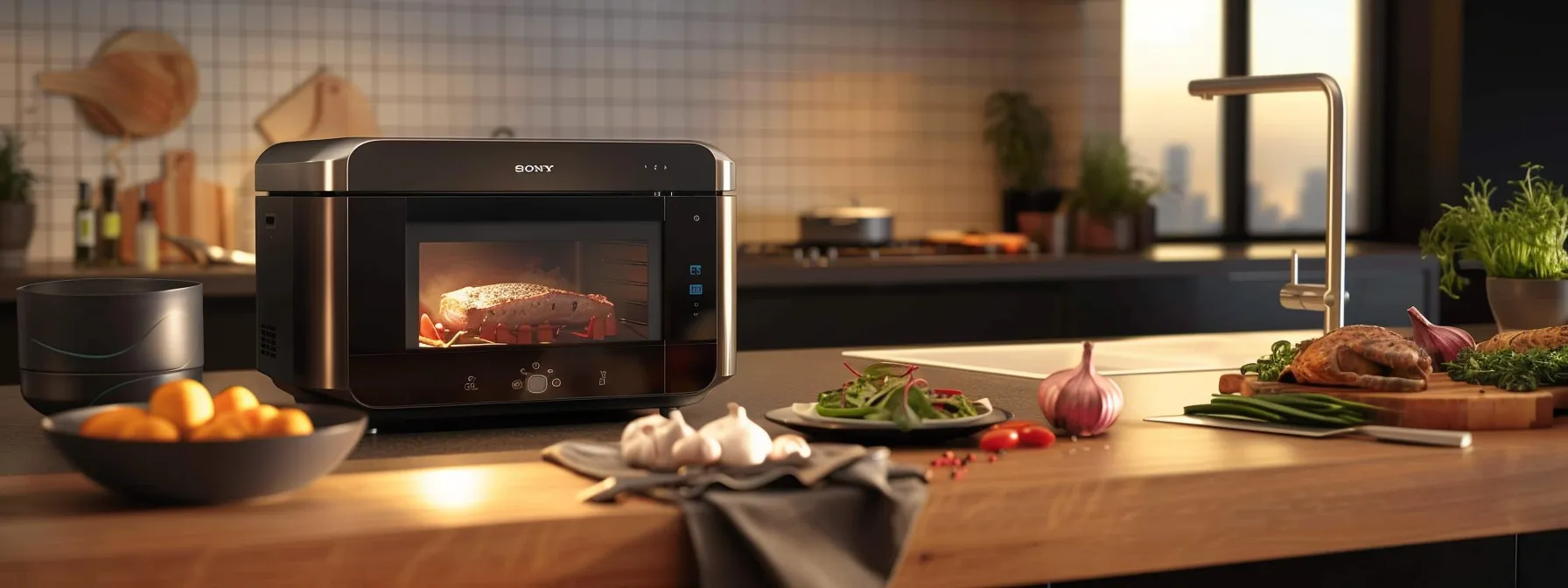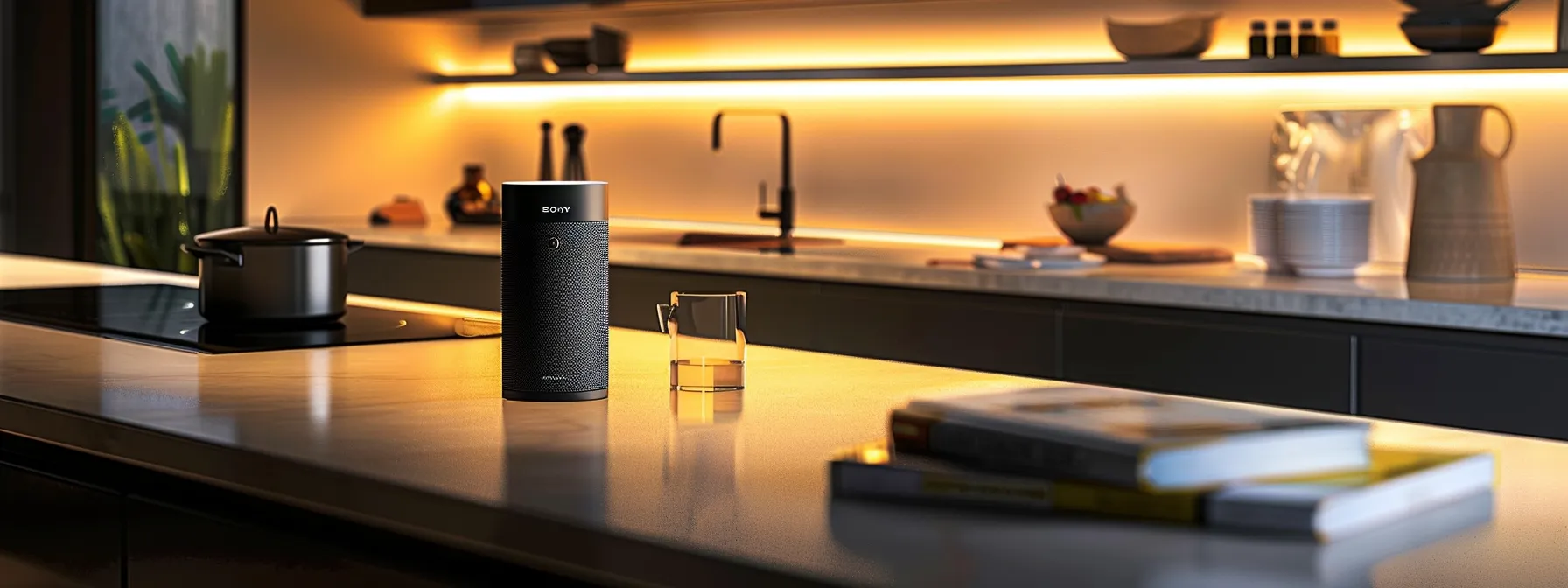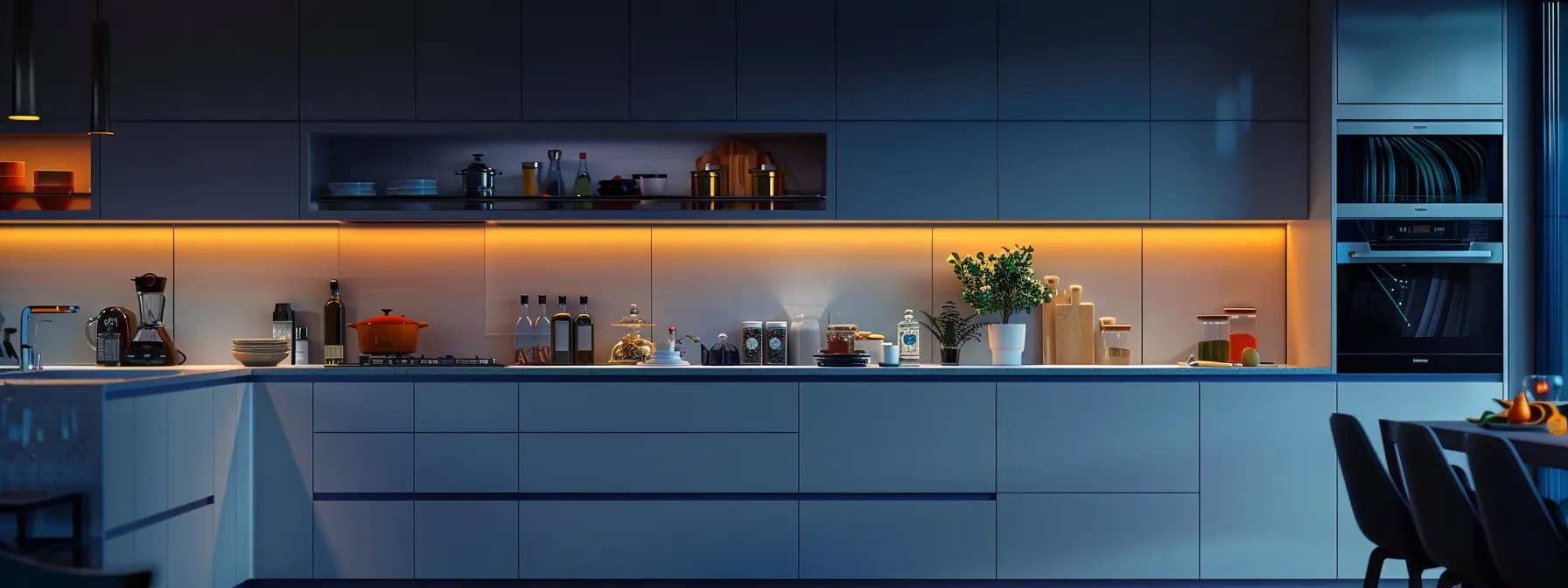

Are you looking to upgrade your kitchen while making it more functional? Smart kitchen technology offers innovative solutions that can transform your cooking space. This blog post will explore essential smart appliances, the role of voice assistants, and how energy efficiency can elevate your kitchen remodel. By the end, readers will understand how to integrate these technologies seamlessly into their homes, ensuring their kitchens are more efficient and enjoyable to use. Whether you’re planning a full remodel or simple updates, this information will help create a kitchen tailored to modern needs.

Key innovations are reshaping modern kitchen design, focusing on essential home appliances that enhance efficiency. Smart technology, including sous vide and other intelligent devices, simplifies daily cooking tasks through features like remote control. This section will explore how these advancements, integrated into meal preparation, elevate the culinary experience significantly.
Smart kitchen technology has transformed modern culinary arts by incorporating energy-efficient appliances that promote sustainability. Brands like Haier and LG Electronics are leading the way, offering ovens and other devices equipped with advanced features that make cooking more efficient and enjoyable. These innovations not only save time but also help homeowners reduce their energy consumption, aligning with the increasing demand for eco-friendly solutions in home remodeling.
Automation and connectivity have become critical components in the design of contemporary kitchens. Smart ovens, for instance, can be controlled remotely, allowing users to adjust cooking settings or monitor their meals from another room. This integration of technology simplifies meal preparation and enhances the overall cooking experience, offering homeowners the flexibility they need to balance their busy lives while enjoying the culinary possibilities their kitchens have to offer.
Smart technology has significantly simplified daily cooking tasks through innovations like smart refrigerators and advanced appliances. These devices often come equipped with features such as automated grocery tracking and even meal planning suggestions, making it easier for homeowners to stay organized and reduce food waste. In addition, some modern kitchens now include machines for food preparation that automate repetitive tasks, allowing users to focus more on the enjoyable aspects of cooking.
The integration of advancements like leak detection systems in smart appliances adds another layer of convenience and safety. These systems can alert homeowners to potential issues before they become major problems, providing peace of mind and reducing costly repairs. With smart technology in the kitchen, daily cooking routines become less stressful and more efficient, offering practical solutions to common challenges faced by homeowners:
With the introduction of intelligent devices, meal preparation has become more convenient and efficient, allowing the modern chef to focus on creativity. Smart kitchen electronics, such as programmable ovens and induction cooktops, provide precise control with the push of a button, ensuring optimal cooking results. This convenience transforms the kitchen into a space where home remodeling meets functional innovation, streamlining the cooking process.
Moreover, these advancements offer homeowners practical solutions to common cooking challenges. For instance, devices that integrate recipe suggestions based on available ingredients help reduce food waste and encourage culinary experimentation. By enhancing meal preparation with these intelligent systems, homeowners can enjoy a more enjoyable cooking experience while maximizing the value of their kitchen remodel.

Smart ovens revolutionize cooking, offering convenience and precision for daily meal preparation. Integrating smart refrigerators enhances ingredient tracking and reduces consumption. Smart dishwashers play a vital role in maintaining cleanliness with minimal effort. Additionally, multi-functional smart cooking tools simplify various tasks, making kitchen remodeling an exceptional blend of efficiency and innovation.
Smart ovens represent a significant advancement in kitchen technology, allowing users to streamline cooking with precise heat control and advanced algorithms that simplify meal preparation. These small appliances not only offer reliable cooking results but also often come equipped with inventory tracking features that can automatically suggest recipes based on available ingredients. Brands that focus on integrating these smart functionalities help homeowners create a more efficient cooking environment.
With the capabilities of smart ovens, homeowners can enjoy tailored cooking experiences while maximizing convenience. For instance, an oven can preheat to the ideal temperature based on the selected recipe, ensuring that meals are prepared perfectly every time. The combination of smart technology and traditional cooking methods makes these appliances an essential part of any kitchen remodel, solving common cooking challenges and enhancing culinary performance:
Integrating smart refrigerators into a kitchen remodel offers significant advantages that draw attention from homeowners seeking efficiency. These appliances play a pivotal role in modern foodservice, allowing users to efficiently manage their pantry inventory with features like automated tracking. This not only helps reduce food waste but also ensures that ingredients are consistently available, aligning with the demands of contemporary interior design that values practicality and aesthetic appeal.
Moreover, smart refrigerators provide North American homeowners with features that enhance daily cooking routines and meal planning. For example, some models come with built-in touch screens that allow users to view recipes or check inventory without opening the doors. By incorporating such technology, homeowners can create a more organized and enjoyable kitchen experience, addressing common pain points associated with meal preparation and grocery shopping.
Smart dishwashers play a crucial role in modern kitchens, combining convenience with cutting-edge technology. These appliances are designed to handle varying loads with features that adjust water pressure and wash cycles based on the sensor readings. For instance, GE Appliances has developed models that optimize cleaning performance while minimizing water usage, aligning with sustainability goals and keeping food prices manageable for homeowners.
Furthermore, the integration of smart technology enables dishwashers to communicate with other kitchen devices, simplifying the meal preparation process. For example, a smart dishwasher can notify users when a cycle is complete or adjust its settings based on the load type, making it easier to manage kitchen tasks. This innovation not only enhances functionality but also addresses common pain points like time management and efficiency in busy households:
Multi-functional smart cooking tools are rapidly changing the way homeowners approach meal preparation, particularly in terms of efficiency and nutrition. For instance, devices showcased at the Consumer Electronics Show often include features for baking, steaming, and sautéing, allowing users to tackle various cooking methods with a single appliance. Whirlpool Corporation has been notable in integrating such technology, providing solutions that not only streamline cooking processes but also promote healthier eating habits by simplifying meal planning.
These innovative tools make it easier for home cooks to experiment with their culinary skills without feeling overwhelmed. By incorporating smart functionalities, such as pre-programmed settings for popular recipes, these appliances can help enhance the overall cooking experience while saving time. With an increasing focus on functionality, homeowners are well-equipped to meet their cooking needs effectively and enjoyably:

Voice-activated devices, such as the Amazon Echo, play a significant role in modern kitchens, providing seamless cooking assistance. These smart speakers facilitate hands-free cooking, allowing users to control appliances like the Instant Pot or receive recipe guidance while multitasking. Voice commands enhance convenience by simplifying tasks, reducing waste, and monitoring potential leaks in the kitchen environment.
The following topics will delve into the popular voice-activated devices for cooking assistance, how smart speakers enhance kitchen convenience, and the practicality of voice commands for hands-free culinary tasks.
Voice-activated devices are increasingly popular for enhancing kitchen efficiency. These tools allow customers to control appliances such as dishwashers and microwave ovens hands-free, simplifying cooking routines. With just a vocal command, users can access recipes, set timers, or adjust appliance settings, making meal preparation smoother and more convenient.
The integration of smart speakers into kitchen environments offers practical solutions for food storage and organization. For instance, a voice assistant can help keep track of ingredients, provide reminders for expiration dates, and even suggest meal ideas based on inventory. This functionality not only elevates the kitchen experience but also aligns with trends noted by Forbes, showcasing how technology transforms home cooking.
Smart speakers, like those powered by Google Assistant, revolutionize kitchen tasks by offering hands-free control, allowing homeowners to multitask effectively. With voice commands, users can operate gadgets such as slow cookers, set timers, or check the status of their cooking without needing to pause their culinary activities. This level of convenience not only responds to the growing demand for efficiency in kitchen design but also ensures that meal preparation becomes a seamless experience.
Furthermore, integrating smart speakers with mobile apps enhances cooking efficiency by guiding users through recipes or providing suggestions based on available ingredients. This capability simplifies meal planning, making it easier for homeowners to stay organized and reduce stress in the kitchen. By incorporating these smart technologies, homeowners can elevate their cooking experience and enjoy the benefits of modern kitchen renovations:
Voice commands significantly simplify cooking tasks, allowing homeowners to manage their kitchen with ease. With the power of automation, users can instruct their convection ovens or toasters to begin cooking or browning food without lifting a finger. This seamless integration not only saves time but also enhances safety, as individuals can operate their kitchen hood and appliances while multitasking, reducing the risk of accidents in the kitchen.
Moreover, utilizing voice-activated technology allows people to control not just major appliances, but also countertop gadgets. By speaking simple commands, homeowners can seamlessly adjust settings on their devices, check cooking times, or even receive recipe suggestions. This practical integration of voice commands streamlines meal preparation, alleviating the stress of juggling multiple tasks while ensuring that meals are prepared to perfection.

Energy-saving appliances offer significant benefits, enhancing kitchen efficiency while contributing to a sustainable ecosystem. Innovations like smart cooktops are designed to optimize energy use, and eco-friendly technologies help reduce waste through effective humidity control. Understanding smart water management systems further complements these advancements, illustrating how modern kitchens can operate sustainably and efficiently.
Energy-saving appliances, such as those offered by brands like Miele, provide homeowners with significant advantages by reducing electricity consumption while maintaining high performance. These innovations often feature smart technology integrations, allowing devices to connect with home automation systems like Google Nest. This seamless connection enables users to monitor energy use and receive insights on their appliances, enhancing efficiency during activities such as roasting, baking, or meal preparation.
Implementing energy-efficient appliances in kitchen remodels not only supports environmental sustainability but also contributes to long-term cost savings. Homeowners can enjoy the benefits of reduced utility bills while relying on advanced cooking technologies designed for optimal results. By focusing on these innovations, individuals can make informed choices that align with their values and enhance their overall cooking experience in a modern kitchen environment.
Eco-friendly technologies play a crucial role in reducing waste in modern kitchens, enhancing usability for the consumer. For example, innovative food processors now incorporate machine learning, which allows them to optimize ingredient usage and minimize food waste by suggesting portion sizes based on user preferences and historical data. This not only promotes sustainability but also supports efficient meal preparation in busy households.
Furthermore, advancements in smart lighting systems contribute to environmental responsibility by automatically adjusting brightness based on the time of day or the presence of people in the kitchen. This means less energy consumption and a lower carbon footprint, helping homeowners to create a kitchen that aligns with eco-friendly values. By integrating such technologies, consumers can significantly enhance their cooking experience while maintaining a commitment to sustainability.
Smart water management systems are becoming integral to modern kitchens, offering homeowners enhanced control over water usage and efficiency. By incorporating motion sensors, these systems can automate water flow, turning off taps when not in use, which not only conserves water but also promotes sustainability. This technological innovation allows chefs to focus on food preparation while ensuring their kitchen remains eco-conscious and efficient.
Additionally, smart water management systems can be personalized to meet specific tastes and preferences, allowing users to adjust water temperature or flow rates based on individual needs. This level of personalization enhances the culinary experience, ensuring that every cooking task aligns with the homeowner’s requirements. Furthermore, integrating proper ventilation with these systems ensures that moisture from cooking does not compromise food flavor or texture, creating an ideal environment for meal preparation.

Smart solutions for small kitchens emphasize maximizing space while integrating essential technology. Designing open-concept areas allows for efficient connectivity among appliances, enhancing user experience. Customizing smart features addresses unique homeowner needs, ensuring functionality aligns with personal lifestyles. Each of these approaches offers practical insights to make the most of smart kitchen technology during a remodel, resulting in a space that is both efficient and enjoyable.
In smaller kitchens, optimizing space while integrating smart technology can significantly enhance functionality. Smart appliances, such as compact refrigerators and multi-functional cooking devices, can streamline meal preparation without occupying too much physical space. Utilizing storage solutions like modular shelving or pull-out cabinets can also ensure that each appliance is accessible when needed while maintaining an organized environment.
Moreover, implementing smart lighting and automation can make a small kitchen feel larger and more inviting. Motion-activated lights and smart thermostats can adapt to user activities, providing both convenience and energy efficiency. By focusing on these innovative solutions, homeowners can create a harmonious balance between technology and design, transforming even the smallest kitchens into efficient cooking spaces:
Designing open concept spaces with smart technology enhances both functionality and aesthetics in modern kitchens. By incorporating interconnected appliances, homeowners can streamline their cooking and entertaining processes. Smart features like automated lighting and voice-activated controls allow for seamless transitions between cooking and socializing areas, making the kitchen a hub of activity.
Furthermore, integrating smart technology into open concepts provides opportunities for effective space utilization. Examples include smart refrigerators that communicate inventory levels and suggest recipes, ensuring that homeowners have everything they need at their fingertips. This thoughtful combination of design and technology not only improves efficiency but also transforms the kitchen into a welcoming, interactive environment that meets the demands of contemporary living.
Customizing smart features in kitchen design allows homeowners to tailor technology to their specific lifestyles and preferences. For example, integrating voice-activated controls can empower busy individuals to manage cooking tasks without interrupting their activities. This personalization offers practical solutions for common challenges, such as multitasking or maintaining organization in the kitchen.
Additionally, homeowners can leverage smart appliances that align with their cooking habits, whether they require advanced meal planning applications or automated inventory tracking. By selecting devices that fit their unique needs, families can enhance both efficiency and enjoyment in daily meal preparation. This approach not only optimizes the kitchen experience but also merges convenience with innovation during a remodel.

The rise of augmented reality is transforming cooking experiences, allowing users to visualize recipes in real-time. Upcoming kitchen automation innovations promise increased efficiency and enhanced user convenience. Predictions for smart kitchen developments in 2025 suggest a greater integration of AI, leading to more personalized cooking solutions. Each of these topics offers practical insights into shaping future kitchen designs.
The integration of augmented reality (AR) in cooking is set to revolutionize kitchen experiences by enhancing how recipes are visualized and followed. With AR technology, homeowners can overlay digital instructions onto their real-world kitchen environments, making complex cooking processes more straightforward and interactive. This innovative approach not only caters to novice cooks but also empowers experienced chefs to experiment with new recipes while minimizing errors.
Furthermore, AR can facilitate personalized cooking sessions by allowing users to visualize ingredient measurements and cooking times directly in their workspace. For instance, a virtual assistant could illustrate where to place ingredients or provide real-time feedback on cooking techniques, promoting efficiency in meal preparation. As homeowners look to remodel their kitchens with the latest technology, embracing augmented reality offers a modern solution that enhances both functionality and user engagement:
Upcoming innovations in kitchen automation are set to significantly impact the way homeowners approach meal preparation. Enhanced connectivity features in smart appliances will allow users to integrate all kitchen devices into a single, user-friendly platform. This seamless interaction not only simplifies cooking processes but also provides real-time updates on ingredient inventory, ensuring that meals can be prepared without unnecessary trips to the grocery store.
Additionally, advancements in machine learning will enable appliances to adapt to individual cooking styles over time. For instance, a smart oven could learn a homeowner’s preferred temperatures and cooking times for various dishes, automatically adjusting settings for optimal results. This level of automation enhances convenience and efficiency, addressing common pain points associated with busy lifestyles while making the cooking experience more enjoyable and personalized.
In 2025, smart kitchen development is expected to focus on enhanced connectivity among appliances, leading to a more cohesive cooking environment. Homeowners will benefit from smart technologies that seamlessly integrate kitchen devices, allowing for real-time updates on inventory and meal planning. This advancement will simplify meal preparation, transforming traditional cooking routines into efficient processes that cater to busy lifestyles.
Additionally, machine learning will play a pivotal role in customizing kitchen experiences, with appliances adapting to individual cooking preferences over time. For example, smart ovens may be equipped to remember specific temperature settings for favorite recipes, ensuring optimal cooking results with minimal effort. These innovations will not only meet the needs of modern cooks but also create opportunities for culinary exploration, making kitchen remodeling a more enjoyable experience for homeowners.
Revolutionary kitchen technology plays a crucial role in modern home remodeling, significantly enhancing efficiency and convenience for homeowners. With smart appliances like ovens, refrigerators, and dishwashers, individuals can streamline meal preparation, reduce waste, and enjoy personalized cooking experiences. Incorporating these innovative devices not only elevates culinary performance but also supports sustainability and energy efficiency. Embracing these advancements transforms kitchens into functional, enjoyable spaces that align with contemporary lifestyles.
